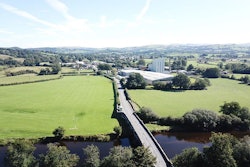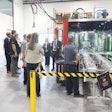Open Farm, a premium pet food brand committed to raising the bar on pet nutrition, announced today its bold 10-year decarbonization strategy.
With sustainability and transparency at its core, Open Farm is embarking on a progressive journey to greatly reduce the brand's carbon footprint by 2030. Starting with a commitment to offset emissions from the company's direct operations and manufacturing, Open Farm will set and work towards ambitious science-based targets to reduce their greenhouse gas emissions as part of its new Climate Strategy, expanding the brand's established Do Some Good Initiative.
"At Open Farm, we have always set out to pioneer better standards and practices in our industry, and this aggressive carbon reduction plan is a crucial next phase of that leadership journey," says Isaac Langleben, CEO at Open Farm. "While on a mission to provide pets with healthy, high-quality nutritional offerings, sustainability has always been at the heart of our brand. As we look to continuously improve on our own practices, we are excited to share our Climate Strategy. We are looking forward to sharing our progress with you as we embark on this path to reducing our carbon footprint"."
To establish the company's Climate Strategy, Open Farm has measured its emissions and is pledging to reduce its Scope 1 and Scope 2 emissions by 42 percent over the next decade, in line with the 1.5-degree Celsius goals of the Paris Agreement on Climate Change. Science-based targets require that emissions decrease in absolute terms even as the company grows, which is especially significant for a company like Open Farm, experiencing rapid growth. In addition to this pledge, Open Farm has begun building a framework to reduce Scope 3 greenhouse gas (GHG) emissions and will be implementing aggressive reduction targets over the course of the next year.
As a first plan of action toward offsetting carbon emissions, Open Farm has chosen to support three high impact programs that provide verified carbon offsets. These particular offset programs contribute to the preservation of important ecosystems in the agricultural and forestry sectors and have co-benefits that reflect Open Farm's mission, such as the preservation of biodiversity and the protection of endangered species.
- Grasslands Portfolio, USA: This program preserves grasslands in Southeast Colorado and Northeast Montana. These areas are essential to many plant and animal species such as grizzly bears, grey wolves, badger and swift fox.
- Darkwoods Forest Conservation Project, Canada: Located in British Columbia, this project sequesters carbon reserves and protects essential habitats for dozens of at-risk animal species. By protecting ecosystems and conservation areas consisting of parks and forest lands, the project also preserves numerous freshwater systems throughout the mountainous region.
- Teak Afforestation, Mexico: This afforestation project creates plantations to help remove large quantities of carbon dioxide next to land used for cattle farming. This contributes to climate change mitigation while providing employment opportunities for local communities.
Open Farm has worked with WSP Global Inc., a world leading professional services firm specializing in managing and maximizing opportunities related to sustainability, climate change and the environment. In partnership with WSP, Open Farm conducted a thorough analysis of their Scope 1, 2 and 3 emissions. The company is committed to transparently sharing its sustainability journey through annual reporting of its carbon footprint and progress towards its long term-targets.
To learn more about Open Farm and its Do Some Good Initiative, visit openfarmpet.com/climate













